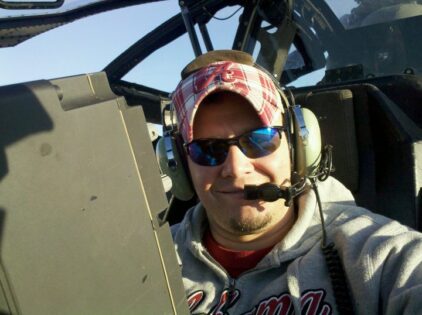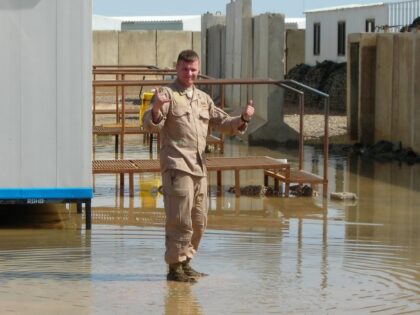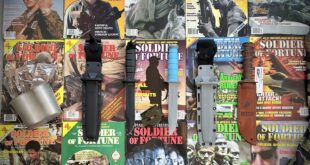by Fred A. Ganous, SGM, USA (Ret)
My wife and I decided that we were due for a much-needed vacation. Our home was less than a three-hour drive to the beach; that was the destination we were headed for. As we were driving, I received an unexpected phone call from the distressed wife of one of my soldiers. Although this soldier had officially retired from the service, I still had a duty to help when called upon.
I was a platoon sergeant within a flight company of degenerates. These men were hard workers and never let a mission down, but it came with a price. That price was answering calls from wives, girlfriends, or sometimes the local law enforcement authorities. Once in a leadership role, it tends to stay with you; you can’t wash it off.

I would receive these calls few and far between, and I never really took them too seriously. The soldier never verbally said that he was going to end his life, but I did know what the thought process might be. While on the phone with the wife, I assured her that the soldier was probably just trying to gain attention from her or wanted some sort of sympathy. I did my best to calm her down on the phone and informed her I would call the soldier. I did just that; I hung up with her and dialed the soldier up, all while my wife looked annoyed at me while driving to that relaxing place on the beach. My wife told me, “You can’t fix everybody’s issues.” I knew I was only putting a bandage on it again.
READ MORE from Fred Ganous, about the Death Angels in Iraq
This soldier and I became good friends after he retired from the military. He had come from a devout military family where his father was a helicopter instructor pilot for the army. This soldier’s father had retired after serving our country for many years, and his son wanted to follow in his father’s footsteps.
I should have taken his warnings more seriously, but I could not see the pain inside him. I never worried about this soldier harming himself because I knew he believed in Christ. That said, Christianity does not condone this type of action in a human. This is why I was never too concerned about his steps; I just ignored the warning signs.
After some time, the soldier started improving, and received support from some veteran programs for his problems. His parents stated he started smiling once again, and he was, in the past, a pure jokester. He had many friends in the military, and it was hard not to grow fond of him. Everyone wanted to be in his presence; he possessed this intriguing yet comforting smile about him. Never really understood it, but his smile was addicting.
We all thought he had finally grasped the beast inside and was in control. Things were good, he had a new job working on helicopters, and this was the love he had while serving in a flight company of military aircraft. He was part of a helicopter unit that was sent to Iraq during one of the worst times for aviation. He flew many combat hours and was always the first to volunteer if we were short crewmembers.
Before this deployment, he volunteered three years prior for a position on a ground team that would go into small villages to befriend the elders. He put himself in danger on many occasions, but he loved his job with the military and serving his country; nothing was going to stop him.

One afternoon while pre-flighting his helicopter, he fell while doing routine maintenance and succumbed to a back injury. The military felt they needed to send him from Iraq due to his injuries. He fought trying to leave because his heart and desire were with his teammates, his unit, and his military family.
This nearly destroyed him having to depart and travel to Germany for medical attention. He was told that his injuries were too severe to return to his combat unit. He was sent stateside to a warrior transition unit where they cared for injured soldiers from the war. I corresponded with him until we arrived stateside as well. He had sunk into a deep depression, and even his parents could tell just by a phone call that things were going south. Once we reached our demobilization station, we would connect again, and his medical staff thought it would be good for him to reunite with us and stay a few days.
I had him bunk with me, and he wrote in his journal every night. When I now looked at him, I knew something was different. He did not have that intriguing look in his eyes any longer; I knew he was fighting something, but what.
Eventually, everyone returned home with family to settle into civilian life. Still, this soldier struggled to find himself and his place again. Nothing worked any longer. See, in the military, you don’t talk about your issues. This can have a drastic impact on your career and your life. Combat veterans all have some demon inside them, but we never tell our family, friends, or battle buddy; it makes us look too fragile. Not reaching out has impacted our veteran community again, and we lose another to the “22 a day” veteran suicides. This young soldier was lost because his friends could not detect and mitigate the problem in front of us.
This soldier became my dear friend Jason. I did not take the time that I should have to discuss his issues with him. I was his leader in the military, the strong one who said, “just suck it up, and move forward.”
With this, he put on his army dress greens with all his ribbons and medals one evening and headed south in his vehicle. He had a vehicle accident resulting in a hit and run while on the phone, reaching out to his counselor. This is where the local law enforcement got involved.

Eventually, the officers had to push Jason’s vehicle into a median on the highway in pursuit of him, where he came to a complete stop. Jason’s truck and the patrol car collided and connected in a highway median. Jason crawled onto the hood of his truck, dressed courageously and firmly in military attire. He pointed an unloaded weapon at the police. This is where the officers take control of Jason’s demons.
The officers had finally ended Jason’s pain, and he could rest. He was 30 years old.
If I had stayed on the phone longer or embraced him rather than told him to “man up,” he might still be with us. This is something that I will never forget as long as I live, for all this took place on my birthday. The day that everyone celebrates while blowing candles out on their cake.
From this point on, I can no longer celebrate another year of growing older but only mourn another year for the loss of my comrade in arms, Jason.
Fred Ganous is a combat veteran of the Iraq war, and has spent his career in aviation.
Are you a veteran in crisis or concerned about one? You’re not alone—the Veterans Crisis Line is available 24/7. You don’t have to be enrolled in VA benefits or health care to call. You can reach the Veteran Crisis Line by dialing 988, and then press 1; or text or Text 838255.
 Soldier of Fortune Magazine The Journal of Professional Adventurers
Soldier of Fortune Magazine The Journal of Professional Adventurers






